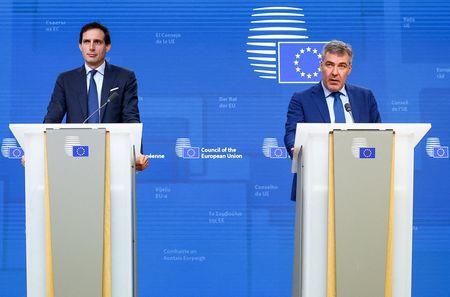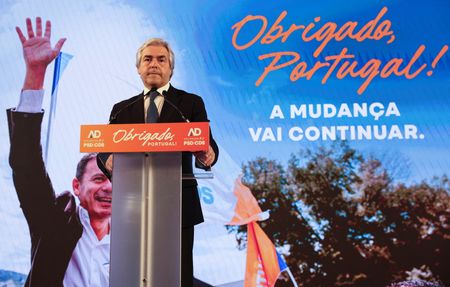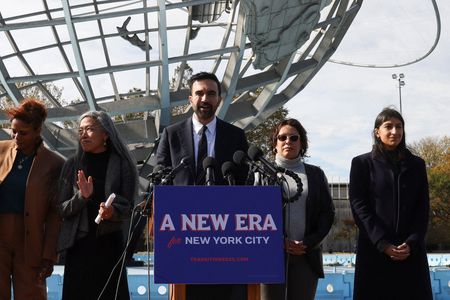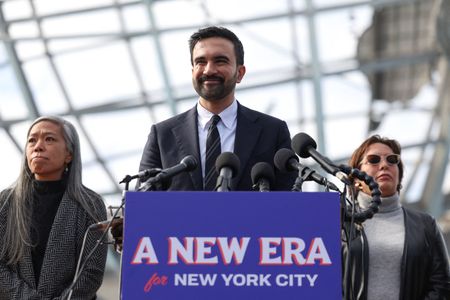By Andrew Osborn and Dmitry Antonov
MOSCOW (Reuters) -Russia said on Wednesday it had detained an Uzbek man who had confessed to planting and detonating a bomb which killed a top general, Igor Kirillov, in Moscow on the instructions of Ukraine’s SBU security service.
Kirillov, who was chief of Russia’s Nuclear, Biological and Chemical Protection Troops, was killed outside his apartment building on Tuesday along with his assistant when a bomb attached to an electric scooter went off.
He is the most senior Russian military officer to be assassinated in Russia by Ukraine. Ukraine’s SBU intelligence service took responsibility for the killing after Ukraine accused Kirillov of being responsible for the use of chemical weapons against Ukrainian troops – something Moscow denies.
Russia’s Investigative Committee, which probes serious crimes, said in a statement on Wednesday that the unnamed suspect had told them he had come to Moscow to carry out an assignment for Ukraine’s intelligence services.
In a video published by the Baza news outlet, which is known to have sources in Russian law-enforcement circles, the suspect is seen sitting in a van describing his actions.
It was not clear under what conditions he was speaking and Reuters could not immediately verify the video’s authenticity.
Dressed in a winter coat, the suspect is shown saying he had come to Moscow, bought an electric scooter, and received an improvised explosive device.
He describes placing the device on the electric scooter and parking it outside the apartment block where Kirillov lived.
Investigators cited him as saying he set up a surveillance camera in a hire car which, they said, was watched in the Ukrainian city of Dnipro by people who organised the killing.
The suspect, who is thought to be 29, is shown saying he remotely detonated the device when Kirillov left the building. He says Ukraine had offered him $100,000 and residency in a European country.
MOSCOW TO RAISE INCIDENT AT U.N. SECURITY COUNCIL
Maria Zakharova, a spokeswoman for Russia’s Foreign Ministry, said Moscow would raise the assassination at the United Nations Security Council on Dec. 20.
“We see that the Kyiv regime has taken responsibility once again for a new terrorist attack. All these SBU losers and the mad Kiev regime are all tools managed by the Anglo-Saxons,” she said, using a term Russia uses to describe the United States and Britain. “They are the main beneficiaries of Kyiv’s terrorism.”
The U.S. State Department said Washington had no connection to the killing or any prior knowledge of it. A spokesperson for British Prime Minister Keir Starmer said Kirillov had “propagated an illegal invasion and imposed suffering and death on the Ukrainian people.”
Russian President Vladimir Putin has not commented publicly on the killing. Dmitry Peskov, his spokesperson, praised the work of the Russian intelligence services in investigating the case and accused Ukraine of using “terrorist methods.”
Former President Dmitry Medvedev criticised an editorial in the London Times newspaper which called the killing “a legitimate act of defence by a threatened nation”.
He said the same logic would imply Western officials providing Ukraine with military aid would be legitimate targets for Russia and called the management of The Times “lousy jackals” who could also be considered accomplices and military targets.
“So be careful,” he said. “After all, a lot of things happen in London.”
The Times quoted Starmer’s spokesperson as saying London took Russian threats “incredibly seriously” and would do whatever it took to protect its citizens.
British foreign minister David Lammy wrote on social media: “Russia’s Medvedev’s gangster threat against Times journalists smacks of desperation.”
Moscow holds Ukraine responsible for a series of killings on its soil. Ukraine says Russia’s war against it poses an existential threat to the Ukrainian state and has made clear it regards such killings – intended to weaken morale and punish those Kyiv regards guilty of war crimes – as legitimate.
(Reporting by Reuters in Moscow; Additional reporting by Filip Lebedev, Writing by Andrew Osborn, Editing by Guy Faulconbridge and Timothy Heritage)












